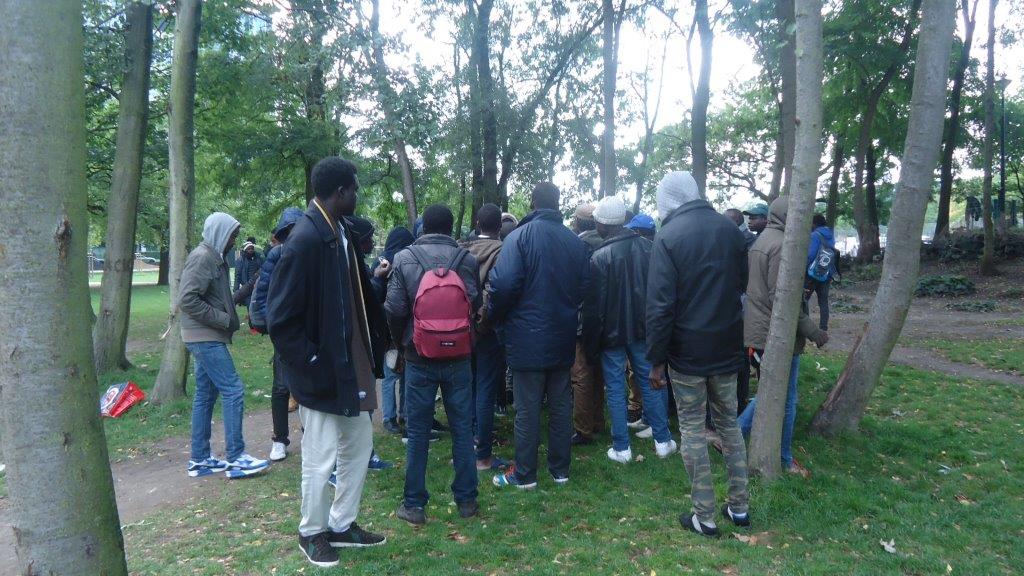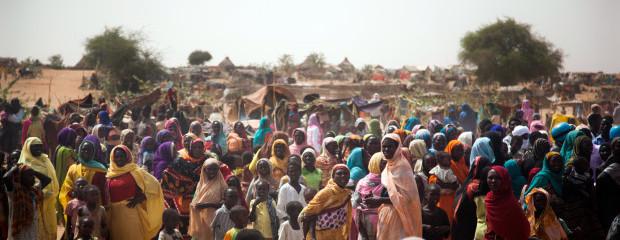
Debating Ideas is a new section that aims to reflect the values and editorial ethos of the African Arguments book series, publishing engaged, often radical, scholarship, original and activist writing from within the African continent and beyond. It will offer debates and engagements, contexts and controversies, and reviews and responses flowing from the African Arguments books.

Migrants in Park Maximilien Brussels @PICUM
“In Brussels, I live in a squat, which was better than living in the street like before the pandemic. Even if I applied for asylum I would not get shelter from the state because I was already finger-printed in France. And actually applying for asylum is too difficult now because it can only be done online and I have no smartphone or email address. If I want to break Dublin[1] I have to give an official address in Belgium and wait for 6 months, if I do not have an address I have to wait for 18 months in the street. The only option for me is to stay in the squat – without protection and only minimal rights – or to try and get to the UK” (Sudanese man in Brussels).
This quote is typical for undocumented Sudanese in Belgium. Of course, another option would be to return voluntarily to Sudan. However, even though the government in Sudan has changed, the Sudanese we have spoken to in Brussels feel that the economic crisis, the fragile political situation, and ongoing violence in Darfur, mean it is not safe to return. This feeling is magnified by the presence of Mohamed Hamdan Dagalo (also known as Hemedti), the leader of the Rapid Support Forces (RSF) and responsible for atrocities in Darfur, at the heart of the transitional government. The UK has long been the preferred destination for Sudanese migrants and refugees (colonial links, family ties), but the impossibility of reaching the UK legally to claim asylum has resulted in concentrations of Sudanese first in France and now also in Belgium. From there, some try their luck to get to the UK and, more recently, a few have applied for asylum. This blog highlights first why Sudanese arrive and get stuck in Belgium, second, it looks into the risks they face, their poor treatment and living conditions, and third, how these conditions are amplified during the Covid-19 pandemic. Finally, it considers what needs to be done now, and what we need to know to better protect and assist them.
Sudanese migration to Europe peaked between 2014 and 2016, the time of the so-called European refugee crisis. Rather than creating a crisis in Europe, however, for many their journey to Europe was part of a new phase in Sudan’s long-running conflict in Darfur. From 2003, the former Sudanese government and its allied militia responded to a rebellion with extreme violence; displacing more than 2 million people and killing around 130,000 by January 2005. Conflict and displacement continued, with a surge in 2013, following the creation of the the paramilitary RSF. Other reasons included the collapse of the Libyan state and an increase in smuggling activities. Darfuris mostly left Sudan because they faced attack, surveillance and ill-treatment in both Darfur and Khartoum, and discrimination in finding employment. For many of the displaced, their land remains occupied and farming is not safe. All of this led to a deep sense of despair amongst young people. Most were young men and had lived in camps for the last 10 to 15 years. In 2020, the situation remains fragile, with more than 2 million still in camps, and 9.3 million in need of humanitarian assistance. Many of the displaced are in Darfur, where camps have existed for more than 15 years. Violence and displacement continues, albeit on a smaller scale than in previous years, as evidenced by a recent attack by an Arab militia on a displaced camp in West Darfur, while Libya has further descended into civil war.

Darfur: A New History of a Long War – African Arguments book series
Once in Europe, the violence continues. Sudanese tend to get stuck at borders because few can pay smugglers to cross. Here, they sleep on the street or in forests, with little or no assistance, and are frequently tear-gassed and evicted by the police. Conditions for refugees are bad in Italy so Sudanese attempt to move quickly to France. In France, asylum procedures are slow and confusing, providing further incentives to move on. Until 2016, Sudanese refugees – like others – tried to cross to the UK from Calais, but following the destruction of the ‘Jungle’ camp in October that year, their asylum seeking route shifted to/through Brussels. In Brussels, they camped out at Maximillian Park, an area near the government’s immigration department. Transit migrants, including Sudanese, received some assistance from volunteers and NGOs there. Platforme Citoyennes started a family hosting programme in August 2017, because state provision of shelter was limited or non-existent. It hosted around 300-400 transmigrants per night. Later in 2017, the Platforme started a homeless shelter with support from the City of Brussels, where transit migrants could also stay.
Government policies and police actions have become increasingly hostile. In 2017, Sudanese could be picked up and detained if they had been finger-printed in Italy or elsewhere within the EU. Their biggest fear, however, was deportation back to Sudan, following reports of missions to Belgium by Sudan’s former government’s security apparatus to screen “illegal migrants” and to organise return. In December that year, forced returns caused a political crisis when it transpired that some of those deported had been tortured. The government survived, however, and has taken an increasingly hardline stance since. In March 2018, Belgium formulated new legislation which stipulates that the state takes no responsibility for those who do not seek asylum. This means no shelter or other assistance for those in transit. Despite this increasingly hostile environment, hundreds of undocumented refugees continued to live in Belgium till late 2019. Limited assistance, including information about rights and ongoing police violence, appeared aimed at stopping migrants and refugees from coming to Belgium.
In 2020, undocumented Sudanese are still in Brussels and our initial discussions indicate their situation has worsened; first because asylum procedures have stalled since the revolution in Sudan, and second, because of measures associated with the Covid-19 pandemic. Almost no asylum decisions have been made since the revolution, and the removal of Al-Bashir in April 2019, thus putting even asylum seekers in limbo. Many have been waiting for up to a year and a half, others are there because their asylum claims in other countries have been turned down, and hope they have a better chance in the UK. Although some were in shelters for the homeless or asylum seekers, it seemed many continued to live rough. In January, the Minister for Asylum and Migration decided that specific categories of asylum seekers had no right to accommodation in asylum centres, including those who are under the Dublin III regulation, which is the case for most undocumented Sudanese in Brussels. This is despite an earlier European Court of Justice ruling which stated that Belgium is obliged to provide all asylum seekers with a dignified standard of living.
The Covid-19 pandemic has magnified the hostile environment for both migrants and asylum seekers. In early March, the Immigration Office stopped considering asylum applications and reception centres were closed. On 3 April, the registration centre re-opened but determined that all asylum applications had to be made online, after which asylum seekers must wait for an appointment. Priority is given to families with children and pregnant women who wait up to two weeks for an appointment, whereas single men can wait for as many as five. Most Sudanese migrants are young men, and it is unlikely that most have access to smart phones, computers or email addresses to make such an application. Furthermore, no accommodation is provided while asylum seekers wait for an appointment or the outcome of Dublin III procedures.[2] The Belgian government has not established an exit strategy for this mode of working.
Although during the pandemic some accommodation has been provided by compassionate hoteliers, most migrants and asylum seekers appear to stay in squats or in homeless shelters supported by government, NGOs or the Red Cross. In early 2020, some were in the Port D’Ulysse shelter managed by Platforme Citoyennes but the pandemic dramatically reduced their hosting programme. Humanitarian and public health professionals have raised concerns about the feasibility of social distancing and hygiene measures for displaced and migrant populations; thus raising concerns about Sudanese staying in overcrowded squats, and those who continue to live rough. The chances are also that any paid work done by asylum seekers has been affected by lockdowns. The pandemic, restrictions in movement and other preventive measures have also made it more difficult for voluntary organizations and NGOs to provide assistance. The humanitarian hub (which used to provide assistance for migrants at Gare du Nord, now in Havenlaan) had to limit their work and only resumed activities on 2 June with previous working hours but social distancing will affect their capacity. While Sudanese are no longer detained in closed centres,[3] our preliminary discussions indicate that police violence continues; although now of a different kind: insults and harassment after arrest, usually without access to an Arabic translator.
The risks and conditions faced by Sudanese migrants in Belgium affect both their physical and mental state. Rather than offering asylum to people fleeing violence and persecution, the combination of these polices and practices form a strategy of deterrence instead. While border closures are strengthened, applying for asylum has become almost impossible, and whether you apply for asylum or not, you end up sleeping rough, in squats or in homeless shelters. Assistance is limited because of lockdowns and other preventive measures, while police violence continues. Belgian government strategies give the appearance of offering asylum, while they are actually discouraging people from applying for it. Instead the minimum role of the state should be to provide a secure environment for making decisions on whether to apply for asylum, opting to continue to the UK or returning to Sudan. The issues discussed in this blog are not Belgium’s alone. Part of the problem is that asylum procedures and provisions vary across EU Member States. Better sharing of asylum obligations is needed, while allowing Sudanese to apply for asylum safely in the European country where they have the closest connection. This would need to include the possibility of claiming asylum in the UK without having to enter the country illegally.
Immediate action is needed for the protection and welfare of Sudanese migrants in Belgium. These include: adequate shelter, food, water and health care, including psychosocial support. This recommendation was made in 2018, and is even more pertinent now. Equally important are simpler and quicker asylum procedures, access to translators, and legal support. In addition, further investigation is needed regarding the situation of Sudanese in Belgium: to gather information about their living conditions and the risks they face, asylum procedures and status (i.e. people’s experience and knowledge), access to assistance, the effect of Covid-19 on each of these, the choices they have and what they actually do in response to being stuck. These issues and questions need to be addressed as a matter of urgency.
End Notes
*A refugee is anyone who leaves their country because of experience or fear of persecution or who leaves their country because their lives are at risk can be considered a refugee. This is different from a recognised refugee, who is someone with the legal status of a refugee. In this blog, we use the term migrant to include people who leave their country for any reason (voluntary or forced).
[1]The Dublin III regulations specify that the EU country where someone’s fingerprints were taken on arrival is responsible for asylum claims. If refugees move through the country of first arrival to another EU country, they can be deported under these regulations.
[2]Furthermore, as indicated in the quote at the start of this blog, if the Dublin regulations apply, asylum seekers have to wait for the country where they have been registered for 2 months. Alternatively, the Dublin regulation can be broken if the asylum seeker provides an address in Belgium and waits for 6 months – but no accommodation will be provided by the state during this period. If he or she cannot provide an address, they have to wait for 18 months.
[3]Closed centres are detention centres for those who do not have legal documents to remain in Belgium and who have received orders to leave the country. In our previous study, Darfuris often called them prisons. At the peak of the Covid-19 pandemic, all detainees were released.





